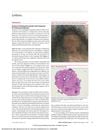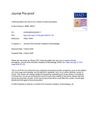 14 citations,
March 2002 in “The journal of investigative dermatology/Journal of investigative dermatology”
14 citations,
March 2002 in “The journal of investigative dermatology/Journal of investigative dermatology” Patients with severe alopecia areata have higher levels of MIF, which decrease after successful treatment.
 49 citations,
January 2003 in “Clinical and Experimental Dermatology”
49 citations,
January 2003 in “Clinical and Experimental Dermatology” The document concludes that post-menopausal frontal fibrosing alopecia is a poorly understood condition that does not respond well to common treatments.
 April 2019 in “Actas Dermo-Sifiliográficas”
April 2019 in “Actas Dermo-Sifiliográficas” The conclusion is that having both Frontal Fibrosing Alopecia and Discoid Lupus Erythematosus may suggest a shared immune response in certain people, and a mix of antimalarial drugs and 5-alfa-reductase inhibitors is recommended for treatment.
 17 citations,
January 2014 in “Journal of Clinical and Diagnostic Research”
17 citations,
January 2014 in “Journal of Clinical and Diagnostic Research” Patients with oral lichen planus or oral lichenoid reactions had worse cholesterol levels and a higher risk of obesity compared to healthy individuals.
 60 citations,
September 2013 in “Alimentary Pharmacology & Therapeutics”
60 citations,
September 2013 in “Alimentary Pharmacology & Therapeutics” Immunosuppressive and anti-TNF therapies in IBD patients can increase the risk of skin cancer and cause various skin issues.
 8 citations,
September 2011 in “European Journal of Dermatology”
8 citations,
September 2011 in “European Journal of Dermatology” Most treatments for Frontal Fibrosing Alopecia are ineffective, but early anti-inflammatory therapy may help and the condition may stabilize over time.
 160 citations,
March 2009 in “Seminars in Cutaneous Medicine and Surgery”
160 citations,
March 2009 in “Seminars in Cutaneous Medicine and Surgery” New insights show Lichen Planopilaris is a rare, scarring hair loss condition, hard to treat, mainly affecting middle-aged women, and significantly impacts mental health.
 17 citations,
August 2019 in “JAMA Facial Plastic Surgery”
17 citations,
August 2019 in “JAMA Facial Plastic Surgery” Some men lost hair after deoxycholic acid treatment for neck fat, but most saw improvement or resolution.
 155 citations,
June 2009 in “International Journal of Dermatology”
155 citations,
June 2009 in “International Journal of Dermatology” Lichen planus is a skin condition that can resolve on its own, is linked to hepatitis C, and increases the risk of skin cancer.
 15 citations,
December 2017 in “Journal of The European Academy of Dermatology and Venereology”
15 citations,
December 2017 in “Journal of The European Academy of Dermatology and Venereology” Frontal fibrosing alopecia and androgenetic alopecia may be related, with a possible shared cause.
 2 citations,
November 2016 in “PubMed”
2 citations,
November 2016 in “PubMed” People with Lichen Planus have thicker carotid artery walls, but it's not solely due to Lichen Planus when other factors are considered.

Lichen planopilaris and frontal fibrosing alopecia are likely the same disease with different clinical appearances.
 179 citations,
October 2018 in “American Journal of Clinical Dermatology”
179 citations,
October 2018 in “American Journal of Clinical Dermatology” Cancer treatments targeting specific cells and the immune system can cause skin, mouth, hair, and nail problems, affecting patients' quality of life and treatment adherence.
 128 citations,
September 2011 in “British Journal of Dermatology”
128 citations,
September 2011 in “British Journal of Dermatology” Obesity is linked to various skin problems and may increase the risk of skin cancer.
9 citations,
June 2023 in “Cells” Certain natural and synthetic compounds may help treat inflammatory skin diseases by targeting a specific signaling pathway.
 5 citations,
June 2012 in “Journal of Cosmetic Dermatology”
5 citations,
June 2012 in “Journal of Cosmetic Dermatology” Female pattern hair loss diagnosis is challenging and should use dermoscopy and histopathology instead of pattern recognition, as hormones may not always be the cause.
 4 citations,
May 2020 in “Journal of The American Academy of Dermatology”
4 citations,
May 2020 in “Journal of The American Academy of Dermatology” Cicatricial pattern hair loss is likely advanced common baldness, not a type of lichen planopilaris.
3 citations,
September 2021 in “JAAD case reports” Denosumab, a bone loss treatment, may cause hair loss and skin reactions due to immune system effects.
 April 2023 in “IP Indian journal of clinical and experimental dermatology”
April 2023 in “IP Indian journal of clinical and experimental dermatology” Lichen planus is a chronic autoimmune disease that is hard to treat and more common in women.
 6 citations,
January 2016 in “Skin appendage disorders”
6 citations,
January 2016 in “Skin appendage disorders” A man with rare Lichen Planopilaris lost body hair, not scalp hair, and treatment stopped itching but didn't regrow hair.
 April 2019 in “Journal of the Dermatology Nurses’ Association”
April 2019 in “Journal of the Dermatology Nurses’ Association” A 37-year-old man with hair loss and skin issues was successfully treated with oral antibiotics, highlighting the need for early treatment. Long-term care includes low-dose antibiotics and avoiding caps and wigs.
 January 2023 in “Indian Journal of Dermatology”
January 2023 in “Indian Journal of Dermatology” The study found that Frontal Fibrosing Alopecia in North-East India mainly affects middle-aged women and is often associated with lichen planus pigmentosus.

Modern skin cancer treatments can cause skin side effects and hair loss, affecting patients' quality of life.
 21 citations,
January 2022 in “Pharmaceutics”
21 citations,
January 2022 in “Pharmaceutics” Colchicine might help treat different skin diseases, but more research is needed to confirm its effectiveness and safe dosage.
 April 2024 in “Oral Surgery Oral Medicine Oral Pathology and Oral Radiology”
April 2024 in “Oral Surgery Oral Medicine Oral Pathology and Oral Radiology” The patient was diagnosed with oral lichen sclerosus and needs long-term monitoring.
 4 citations,
April 2020 in “Dermatology practical & conceptual”
4 citations,
April 2020 in “Dermatology practical & conceptual” Reflectance confocal microscopy is useful for diagnosing and monitoring skin diseases, but it has limitations and requires expertise for correct use.
 17 citations,
November 2002 in “Australasian Journal of Dermatology”
17 citations,
November 2002 in “Australasian Journal of Dermatology” Saw palmetto causes allergic reaction, minoxidil causes skin irritation; use cautiously for hair loss.
 17 citations,
May 1987 in “Clinical and Experimental Dermatology”
17 citations,
May 1987 in “Clinical and Experimental Dermatology” A patient with Sézary syndrome showed improvement after treatment and the study suggested follicular mucinosis might indicate future lymphoma risk.
 11 citations,
May 2010 in “Journal of the South African Veterinary Association”
11 citations,
May 2010 in “Journal of the South African Veterinary Association” Mycophenolate mofetil helped reduce steroid use in treating a dog's autoimmune skin disease.
 37 citations,
October 2015 in “Anais Brasileiros de Dermatologia”
37 citations,
October 2015 in “Anais Brasileiros de Dermatologia” Lichen planopilaris mostly affects women with fair skin and can look different on each person, needing early treatment to prevent hair loss.




























